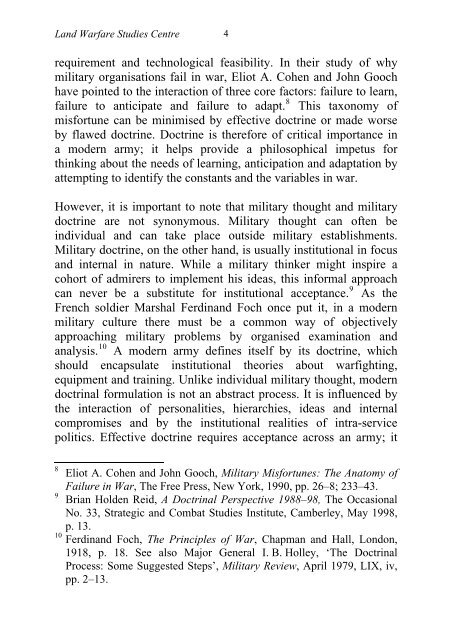Ibid - Australian Army
Ibid - Australian Army
Ibid - Australian Army
Create successful ePaper yourself
Turn your PDF publications into a flip-book with our unique Google optimized e-Paper software.
Land Warfare Studies Centre 4<br />
requirement and technological feasibility. In their study of why<br />
military organisations fail in war, Eliot A. Cohen and John Gooch<br />
have pointed to the interaction of three core factors: failure to learn,<br />
failure to anticipate and failure to adapt. 8 This taxonomy of<br />
misfortune can be minimised by effective doctrine or made worse<br />
by flawed doctrine. Doctrine is therefore of critical importance in<br />
a modern army; it helps provide a philosophical impetus for<br />
thinking about the needs of learning, anticipation and adaptation by<br />
attempting to identify the constants and the variables in war.<br />
However, it is important to note that military thought and military<br />
doctrine are not synonymous. Military thought can often be<br />
individual and can take place outside military establishments.<br />
Military doctrine, on the other hand, is usually institutional in focus<br />
and internal in nature. While a military thinker might inspire a<br />
cohort of admirers to implement his ideas, this informal approach<br />
can never be a substitute for institutional acceptance. 9 As the<br />
French soldier Marshal Ferdinand Foch once put it, in a modern<br />
military culture there must be a common way of objectively<br />
approaching military problems by organised examination and<br />
analysis. 10 A modern army defines itself by its doctrine, which<br />
should encapsulate institutional theories about warfighting,<br />
equipment and training. Unlike individual military thought, modern<br />
doctrinal formulation is not an abstract process. It is influenced by<br />
the interaction of personalities, hierarchies, ideas and internal<br />
compromises and by the institutional realities of intra-service<br />
politics. Effective doctrine requires acceptance across an army; it<br />
8 Eliot A. Cohen and John Gooch, Military Misfortunes: The Anatomy of<br />
Failure in War, The Free Press, New York, 1990, pp. 26–8; 233–43.<br />
9<br />
Brian Holden Reid, A Doctrinal Perspective 1988–98, The Occasional<br />
No. 33, Strategic and Combat Studies Institute, Camberley, May 1998,<br />
p. 13.<br />
10 Ferdinand Foch, The Principles of War, Chapman and Hall, London,<br />
1918, p. 18. See also Major General I. B. Holley, ‘The Doctrinal<br />
Process: Some Suggested Steps’, Military Review, April 1979, LIX, iv,<br />
pp. 2–13.

















